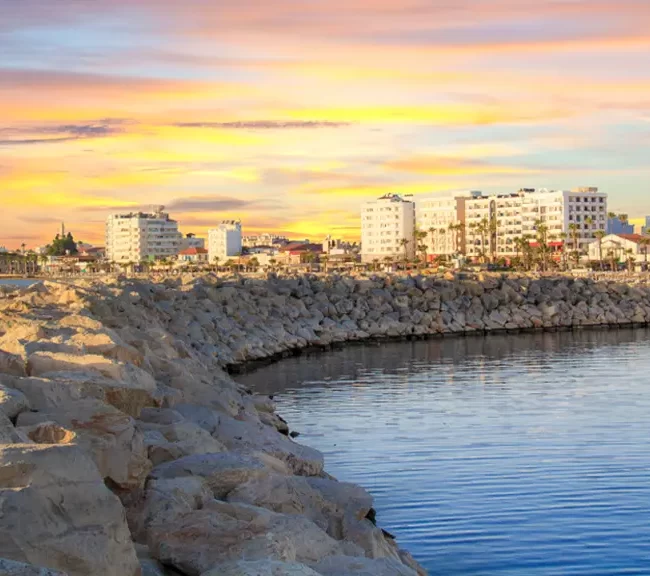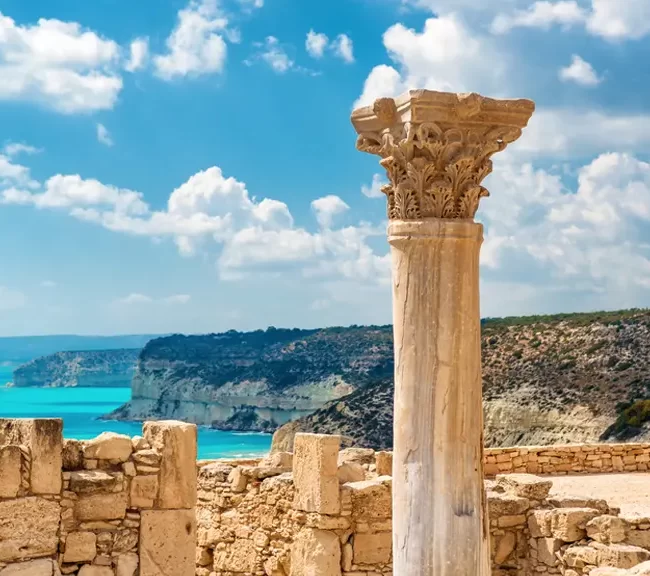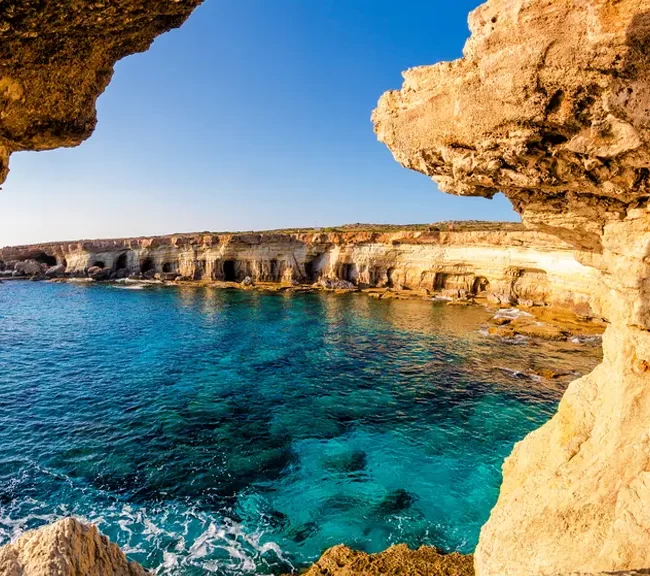About Cyprus
Cyprus is the third largest island in the Mediterranean, after Sicily and Sardinia, with an area of 9.251 sq. kms (3.572 sq. miles). Cyprus lies in the Eastern Mediterranean at the crossroads between Europe, Africa and Asia and is an island of extreme natural beauty with a long and rich heritage.
Cyprus’ coastal line is indented and rocky in the north with long sandy beaches in the south. The north coastal plain, covered with olive and carob trees, is backed by the steep and narrow Pentadaktylos mountain range of limestone, rising to a height of 1.042 m. In the south, the extensive mountain massif of Troodos, covered with pine, dwarf oak, cypress and cedar, culminates in the peak of Mount Olympus, 1.953 m. above sea level. Between the Troodos range and the Pentadaktylos mountain range lies the fertile plain of Messaoria. Arable land constitutes 46.8 percent of the total area of the island. There are no rivers, only torrents which flow after heavy rain. The climate is balmy and sunny and the coastline is scattered with attractive beaches and crystalline bays.
History
The earliest presence of human beings in Cyprus dates back 10,500 years.
Cypriot Flag
The flag of the Republic of Cyprus was defined in 1960 when Cyprus became an independent sovereign state.
Climate
Mediterranean climate - average temperatures of 34°C (in summer) Warm and dry long summers.
Food and Drink
Food and drink of Cyprus reflects the rich and turbulent history of the island and its indelible Greek culture.
History
The earliest presence of human beings in Cyprus dates back 10,500 years. Noteworthy from the prehistoric period are a burial dating back to 7,500 BC, which contained the remains of a cat, making it the earliest evidence of feline domestication in the world and the Neolithic settlement for Choirokoitia, which dates back to 6,800 BC and is a Unesco World Heritage site. The introduction of copper made Cyprus one of the most important exporters of the metal in the Middle East and beyond and during this time we find Cyprus being mentioned in letters between its kings and the kings of Egypt, the Hittite kingdom and the kingdoms of the Levant. It is during the second millennium BC that contact with the Minoan civilization and then the Mycenaeans from Greece brought the first waves of Greek colonization to the island. By the end of the second millennium BC the Greek identity was firmly established on the island. This is also the time that the modern name, Cyprus (Κύπρος in Greek), appeared for the first time. Other people from the Levant, like the Phoenicians, Assyrians, Egyptians, and Persians interacted with Cyprus, either by setting up trading posts or by bringing Cyprus under their direct or indirect control. Alexander the Great seized the island in 333 BC and subsequently it was passed on to Ptolemaic Egypt and then Rome. Christianity was preached in Cyprus by Apostle Paul in the first half of the first century AD and it is said that the Roman proconsul of Cyprus, Sergius Paulus, converted to Christianity, becoming the first Christian ruler. Christianity remains the predominant religion on the island. The island then passed to the Eastern Roman Empire in 330 AD. The island was invaded by the Arabs in 649 AD and from 688 AD it was considered a condominium between the Byzantines and the Arabs. This lasted until 965 AD when the Arabs were defeated by the Byzantine Emperor Nicephorus II Fokas. In 1191 AD King Richard the Lionheart conquered Cyprus and sold it to the Knights Templars who, in turn, sold it to Guy de Lusignan, the former King of the Kingdom of Jerusalem. He was the first King of the Frankish dynasty which ruled Cyprus until 1489 when the widow of the last king, Catherine Cornaro, abdicated her throne in favor of the Republic of Venice. In 1570 the Ottoman Turks invaded Cyprus which fell after a year of fighting. The Ottoman occupation lasted until 1878 when Cyprus became a British Protectorate and, from 1925, a Crown Colony. After an armed struggle by the Greek Cypriots in 1955-59, the island was granted independence in 1960. In 1974 Turkey invaded the north of the island in response to a coup which overthrew the elected president of the Republic of Cyprus and has been occupying 37% of the island since. This resulted in the mass displacement of 160,000 Greek Cypriots to the south and 40,000 Turkish Cypriots to the north. Today the island is a European Union Member State, but the northern part is not controlled by the internationally recognized government of the Republic of Cyprus.
Cypriot Flag
The flag of the Republic of Cyprus was defined in 1960 when Cyprus became an independent sovereign state. The background is white with a copper-coloured (pantone 1385 C) silhouette of the map of Cyprus in the centre of the flag above two crossed olive-green-coloured (pantone 574 C) olive branches. The copper colour has a dual symbolism: first, the name of the island is said to derive from an ancient word for copper (Eteocypriot or Sumerian); and second, copper is closely associated with Cyprus since antiquity when the island became a major producer and supplier of this mineral resource. The olive branches are symbols of peace.
Climate
Cyprus has a Mediterranean climate: hot, dry summers from June to September and mild, wet winters from November to March, which are separated by short Autumn and Spring seasons. Sunshine is abundant during the whole year, particularly from April to September when the daily average exceeds eleven hours. Winds are on the whole light to moderate. Gales are very infrequent and heavy storms rare. Snow hardly falls in the lowlands and on the northern range, but is a frequent feature every winter on ground above 1.000 metres in the Troodos range. During the coldest months it lies in considerable depth for several weeks, attracting skiers.
Food and Drink
The food of Cyprus reflects the rich and turbulent history of the island and its indelible Greek culture. You will find tastes influenced by the Middle East, Asia Minor and the Venetians, all using fresh local ingredients, herbs and spices and olive oil. The Mediterranean diet, with its grains and pulses, sun-ripened fresh fruit and vegetables, high-protein fish, lean meat and poultry and wine is a healthy option. Cyprus has a long tradition in winemaking that goes back over 4,000 years. In ancient times wine was a major source of wealth for the island. The island supplied the Pharaohs of Egypt and Cyprus wines were in great demand amongst the ancient Greeks and Romans. Commandaria is acknowledged to be the oldest wine in the world and was probably the first to be given an ‘Appellation d’Origin'(label of geographical origin). Legend says that Commandaria was originally made for Richard the Lionheart and the Crusaders. The dessert wine, which has a taste not unlike sweet sherry, has been made using the same method for hundreds of years. The grapes are picked late, dried in the sun to enhance their sugar content and then pressed. The run-off is collected and fermented in tanks or in huge earthen ware jars. The sweet wine of Cyprus became known throughout Europe under the name Commandaria depicting its geographical origin “Commandarie” which was the name given to the land owned by the Knights Templar and later the Knights of St. John.
More of Cyprus.
Cyprus offers abundant activities: sights, restaurants, nightlife, cafes, and accommodation.
Latest Posts
1 Min Read
1 Min Read
Categories
Tags


















